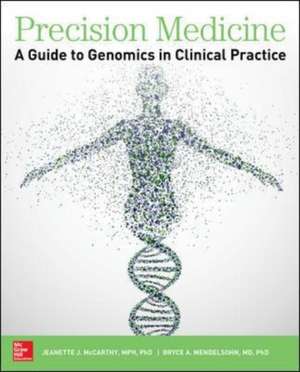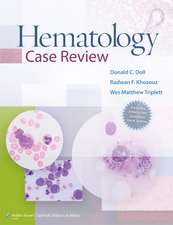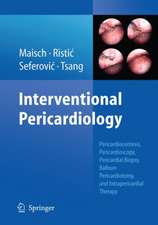Precision Medicine: A Guide to Genomics in Clinical Practice
Autor Jeanette McCarthy, Bryce Mendelsohnen Limba Engleză Paperback – 16 feb 2017
A Doody's Core Title for 2024 & 2022!
Precision Medicine: A Guide to Genomics in Clinical Practice is a comprehensive, yet succinct overview of the practice of genomic medicine. It is written for general healthcare practitioners, specialists, and trainees with the goal of providing detailed guidance on how to incorporate genomic medicine into daily practice.
Features that make this book valuable to every practice:
- Intentionally avoids excessive technical content and consistently emphasizes real-life patient care and decision support
- Follows the course of a human life, beginning before conception through pregnancy, childhood, and adulthood, discussing the current and future applications of genomics and precision medicine at each stage
- Organization allows healthcare providers to quickly and easily find the information relevant to their practice.
- The authors highlight common pitfalls – technical and ethical – that might complicate the delivery of quality genomic healthcare
- Enhanced by eleven valuable appendices that cover important topics ranging from the basics of genetics to ethical issues to regulation and reimbursement
Preț: 499.23 lei
Preț vechi: 728.69 lei
-31% Nou
Puncte Express: 749
Preț estimativ în valută:
95.53€ • 99.99$ • 79.51£
95.53€ • 99.99$ • 79.51£
Carte tipărită la comandă
Livrare economică 03-08 aprilie
Preluare comenzi: 021 569.72.76
Specificații
ISBN-13: 9781259644139
ISBN-10: 1259644138
Pagini: 240
Dimensiuni: 185 x 231 x 13 mm
Greutate: 0.4 kg
Editura: McGraw Hill Education
Colecția McGraw Hill / Medical
Locul publicării:United States
ISBN-10: 1259644138
Pagini: 240
Dimensiuni: 185 x 231 x 13 mm
Greutate: 0.4 kg
Editura: McGraw Hill Education
Colecția McGraw Hill / Medical
Locul publicării:United States
Cuprins
Chapters 1-4: Pregnancy and childhood
Chapter 1: Preconception
What are the applications of precision medicine in the preconception period?
What are the applications of precision medicine during pregnancy?
What are the applications of precision medicine in the newborn period? What are the situations when a clinician should consider a genetic diagnosis, what tests are commonly used, what evaluation can be performed by the non-specialist versus when to refer to a specialist.
What are the applications of precision medicine during childhood and adolescence?
Chapter 5: Pharmacogenetics
What pharmacogenetic tests are available? How valid and useful are they?
How is precision medicine being applied in heart disease?
How is precision medicine being applied in infectious disease?
· Future prospects: diagnostic sequencing
Chapter 8: Cancer
How is precision medicine being applied in cancer?
How is precision medicine being applied in mental health and neurodegenerative disease?
Appendices. Conceptual framework for understanding genomic and precision medicine
Appendix 1: Genome variation
Describes the structure and organization of the human genome and the different types of variation, their consequences and distribution in different populations
A roadmap of different testing methods that a practitioner may come across, what they can measure, and what are their limitations. Includes sample test requisitions and reports with graphical interpretation.
How is genetic variation related to disease?
How do we know if a gene-trait association is valid or clinically useful?
· Evaluating the evidence
o Establishing the role of the gene in disease
· Clinical validity (PPV, NPV)
· Clinical utility (cost effectiveness, comparative effectiveness)
· Where to find evidence, information and practice guidelines
How do we determine pathogenicity of variants in a diagnostic setting?
· Different types of evidence used in variant classification
· ACMG framework for variant classification
· Clinvar and other variant databases
Appendix 5: Regulation and reimbursement
How do regulation and reimbursement play a role in the delivery of precision medicine?
Appendix 6: Cross-cutting ethical issues
What key ethical issues to be aware of with genetic testing?
Chapter 1: Preconception
What are the applications of precision medicine in the preconception period?
- Infertility
- Carrier screening – traditional and expanded
- Genetic counselling, reimbursement, where to get tested
- Future prospects: Preimplantation genetic testing
What are the applications of precision medicine during pregnancy?
- Triple/quad screening
- Amniocentesis/CVS
- Trisomy testing using non-invasive (cfDNA) methods
- Future prospects: expanded uses of cfDNA testing during pregnancy
What are the applications of precision medicine in the newborn period? What are the situations when a clinician should consider a genetic diagnosis, what tests are commonly used, what evaluation can be performed by the non-specialist versus when to refer to a specialist.
- Mandatory newborn screening
- Broad classification and evaluation of birth defects
- Broad classification and evaluation of metabolic disease
- Future prospects: Sequencing from birth
What are the applications of precision medicine during childhood and adolescence?
- Autism and Developmental delay
- Childhood cancer (hereditary cancer)
- Rare diseases and diagnostic sequencing
- Support and advocacy for rare diseases
Chapter 5: Pharmacogenetics
What pharmacogenetic tests are available? How valid and useful are they?
- Types of pharmacogenetic markers
- Efficacy-based, companion diagnostics
- Safety-based, avoiding severe adverse events
- Dosing-based
- Understanding CYP450 alleles
- Sources of information about pharmacogenetic tests
- Drug labels
- Evidence guidelines
- PharmGKB, Dutch group
How is precision medicine being applied in heart disease?
- Predisposition/diagnostic testing for myocardial infarction, thrombosis risk, arrhythmias
- The utility of prognostic markers (e.g. CardioDx test)
- Managing dose, efficacy and side effects of cardiovascular drugs using pharmacogenomics
- Clopidogrel, Warfarin, Simvastatin
How is precision medicine being applied in infectious disease?
- Managing dose, efficacy and side effects of ID drugs using pharmacogenomics
· Future prospects: diagnostic sequencing
Chapter 8: Cancer
How is precision medicine being applied in cancer?
- Diagnostic/predisposition testing for Hereditary cancers
- HBOC, Lynch Syndrome, rare hereditary cancer syndromes
- Managing dose, efficacy and side effects of cancer drugs using pharmacogenetics
- Irinotecan, Belinostat, Azothioprine, Capecitaban, Tamoxifen, Oliparib
- The genetic landscape of tumors
- Prognostic markers
- Targeted treatment and companion diagnostics
- Tumor profiling and expanded treatment options
- Future prospects: cfDNA for screening, diagnosing and monitoring cancer
How is precision medicine being applied in mental health and neurodegenerative disease?
- Predisposition/diagnostic testing for epilepsies, Alzheimer, Parkinson diseases
- Managing dose, efficacy and side effects of antidepressant, antipsychotic, anti-seizure drugs using pharmacogenomics
Appendices. Conceptual framework for understanding genomic and precision medicine
Appendix 1: Genome variation
Describes the structure and organization of the human genome and the different types of variation, their consequences and distribution in different populations
- DNA, RNA, Protein variation
- Origin and types of genetic (DNA) variation (from big to small)
- Consequences of genetic variation
- Patterns of genetic variation across populations and ancestry
A roadmap of different testing methods that a practitioner may come across, what they can measure, and what are their limitations. Includes sample test requisitions and reports with graphical interpretation.
- DNA variation (aCGH, karyotyping, FISH,Targeted genotyping, SNP arrays, Sanger and next-gen sequencing -whole genome, whole exome, panel)
- The unique mitochondrial genome
- RNA variation (QrtPCR, Transcript arrays, next-gen sequencing)
- Protein variation (IHC, mass spectrometry)
- Epigenome variation (Bisulfite sequencing)
- How to find a testing laboratory (general information, specifics discussed within each disease type)
How is genetic variation related to disease?
- Inheritance patterns
- Penetrance, expressivity, environmental influences
- Family history: why it still matters
How do we know if a gene-trait association is valid or clinically useful?
· Evaluating the evidence
o Establishing the role of the gene in disease
· Clinical validity (PPV, NPV)
· Clinical utility (cost effectiveness, comparative effectiveness)
· Where to find evidence, information and practice guidelines
How do we determine pathogenicity of variants in a diagnostic setting?
· Different types of evidence used in variant classification
· ACMG framework for variant classification
· Clinvar and other variant databases
Appendix 5: Regulation and reimbursement
How do regulation and reimbursement play a role in the delivery of precision medicine?
- US FDA and genetic testing
- Insurance coverage of genomic tests in the US
Appendix 6: Cross-cutting ethical issues
What key ethical issues to be aware of with genetic testing?
- Secondary/incidental findings
- Discrimination and GINA
- Privacy and sharing
- Testing minors
- Population screening
- Eugenics and disability rights
- How to gather appropriate informed consent




